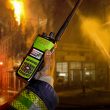House vote on D Block expected today
Members of the House of Representatives today are considering payroll-tax legislation with language to reallocate the 700 MHz D Block spectrum to public safety and provide at least $5 billion in funding for the buildout of a nationwide LTE network for first responders.
Debate on the bill began at 12 p.m. EST today on the floor of the House and is expected to result in a vote of some kind before the end of the day. (Watch live coverage of the vote on your local C-Span channel or at cspan.com.) Although the primary focus of the bill is to extend payroll-tax cuts, the legislation includes language addressing other issues, including accelerating buildout of a controversial oil pipeline, authorization of the FCC’s ability to auction spectrum and matters involving future public-safety communications.
Public-safety communications language in the bill is similar to the legislation approved by a House subcommittee last week, according to Beltway sources and media reports. Sponsored by Rep. Greg Walden (R-Ore.), that bill calls for the D Block to be reallocated to public safety and would provide $5 billion to $6.5 billion in funding for the deployment of a dedicated nationwide LTE network for first responders.
While the D Block and funding are key components to the nationwide-network vision that first responders support, Walden legislation calls for public safety to return its 700 MHz narrowband spectrum to the FCC in the future and has a governance model that has been questioned by many public-safety representatives. In addition, many in public safety have expressed support for other D Block legislation — namely S.911, the bill that has passed the Senate Commerce Committee — that calls for as much as $12 billion in funding for the proposed broadband network.
Key public-safety organizations such as the Public Safety Alliance and the Association of Public-Safety Communications Officials (APCO) issued press releases today informing membership of the House floor debate. The debate has generated considerable action on the part of public-safety personnel, who have been encouraged to communicate with local federal lawmakers to express support for D Block reallocation and opposition to the 700 MHz narrowband giveback, governance and lower funding provisions in the House bill.
“This is probably the widest distribution that we’ve seen, as far as outreach,” said Sean Kirkendall, spokesman for the Public Safety Alliance.
As proposed, the House bill is not expected to pass the Senate, where the Democratic majority is steadfastly opposed to the oil-pipeline language, according to Beltway sources. However, negotiations are “hot and heavy” throughout Capitol Hill in an effort to reach a compromise that would allow some sort of payroll-tax legislation to pass before the Christmas break, Kirkendall said.
In addition, there is still a possibility that public-safety communications language could be included in an omnibus appropriations bill, Kirkendall said. Congress needs to approve a new budget or pass a continuing resolution on the existing budget by the end of the week, he said.

















